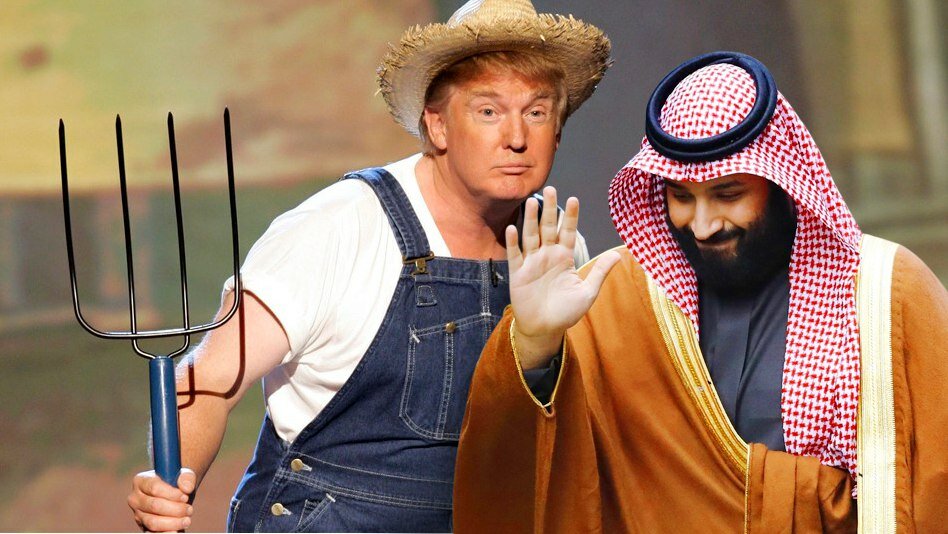TEHRAN – U.S. President Donald Trump is approving the sale of billions of dollars’ worth of weapons to Saudi Arabia, citing Iranian threats to its arch rival to reap the sweet fruit of his weeks-long fierce anti-Iran propaganda where he has claimed increasing threat from Iran to the interests of America and allies in the Middle East.
As the Republican Party presidential candidate, Donald Trump had in 2015 described the Kingdom of Saudi Arabia as a “milk cow”.
Trump had also said that he was “definitely not a big fan” of Saudi Arabia, and that America had paid too much to back the House of Saud.
Trump has now invoked a rarely used aspect of federal law to push through the $8bn (£6bn) deal - bypassing Congress.
He did so by declaring that ongoing tensions with Iran amounted to a national emergency.
The move has angered those who fear the weapons may be used against civilians in Yemen by Saudi-led forces.
According to the BBC, some Democrats accused the president of bypassing Congress because the sale of weapons - including precision-guided bombs - would have been strongly opposed on Capitol Hill.
Weapons will also reportedly be sold to the United Arab Emirates and Jordan.
Members of Congress have heavily criticized Saudi Arabia’s human rights record over its role in the Yemen conflict and for the murder of Saudi journalist Jamal Khashoggi in Istanbul last October.
On Friday, Secretary of State Mike Pompeo notified Congress of the administration’s decision to make the sale. In a letter, widely reported in U.S. media, he said that “Iranian malign activity” required the “immediate sale” of weapons.
“[Iran’s] activity poses a fundamental threat to the stability of the Middle East and to American security at home and abroad,” he wrote.
He said the transfers “must occur as quickly as possible in order to deter further Iranian adventurism in the (Persian) Gulf and throughout the Middle East”.
The move quickly garnered opposition. Democratic Senator Robert Menendez, who sits on the Foreign Relations Committee, accused Trump of “granting favors to authoritarian countries”.
“[He] has failed once again to prioritize our long term national security interests or stand up for human rights,” he said in a statement.
Republican Foreign Relations Committee chairman, Senator Jim Risch, said he had been informed by the Trump administration that it planned to confirm “a number of arms sales”.
“I am reviewing and analyzing the legal justification for this action,” he said.
Senior Democratic Senator Dianne Feinstein said the U.S. needed to rein in Saudi Arabia rather than hand it more weapons.
“My whole view of Saudi Arabia changed with the murder of Jamal Khashoggi,” she said.
Khashoggi, who was a strong critic of the Saudi government, was killed after entering the Saudi consulate in Istanbul. His body was reportedly dismembered and his remains have still not been found.
Iran also reacted angrily to the U.S. move, with Foreign Minister Mohammad Javad Zarif calling it “extremely dangerous” for international peace.
News of the Trump administration’s decision came shortly after it announced it would bolster the U.S. military presence in the Middle East. An additional 1,500 troops, as well as fighter jets and drones, will be deployed to the region in the near future.
Patrick Shanahan, the acting Defense Secretary, says the move was intended to counter “ongoing threats posed by Iranian forces, including the IRGC [Iran’s Revolutionary Guard Corps] and its proxies”.
Tensions between the U.S. and Iran began rising this month when Washington put pressure on countries still buying oil from Iran by ending exemptions from sanctions. The decision was intended to bring Iran’s oil exports to zero, denying the government its main source of revenue.
Trump reinstated the sanctions last year after abandoning the landmark nuclear deal that Iran has signed with six nations - the five permanent members of the UN Security Council and Germany.
Iran has now suspended several commitments under the deal, demanding parties to return to the full implementation of the deal.


No comments:
Post a Comment